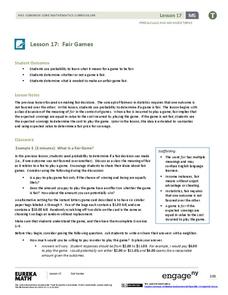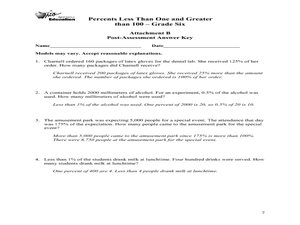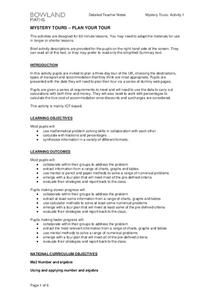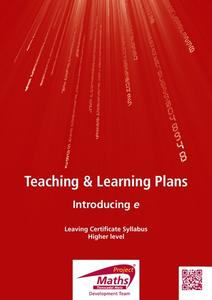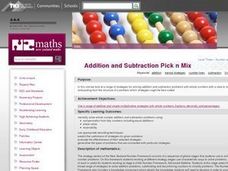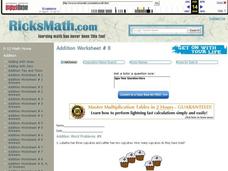Curated OER
Using Standard Deviation, part 2
Pupils explain and learn the practical application of standard deviation. They compare cities in the U.S. and discover whether cities closer to the ocean have more consistent temperatures. Useful resources are given.
Curated OER
The Part-Adder 2
Third graders use mental-math strategies to solve two-digit plus two-digit addition problems. They observe and discuss online demonstrations, solve word problems as a class, and independently solve problems and describe their solutions...
Curated OER
Visual 1: The Cost of Credit
In this money management worksheet, students examine an advertisement for a bike and respond to 3 questions that require them to calculate percentages
Helping with Math
Ratio and Proportion: Writing Ratios (1 of 2)
Here is the first of two printable ratio worksheets. For the first three problems, pupils count the numbers of two different objects and simply write down the ratios. There are then four problems in word form for which they also write...
Curated OER
Fair Games
Fifth graders examine the statistics of playing games. Many games of chance and activities in maths text books involve rolling two dice and combining the scores, usually by addition. Students often find the probabilities of such events...
Curated OER
Paws in Jobland: Lesson Plan 35 - Catch of the Day
Students study information for fish farm workers given in the form of a chart, in order to practice interpreting data while learning about the career of a fisherman. In this data interpretation lesson, students read the chart to find out...
Curated OER
Take A Chance Or Two
A two-part lesson immerses young statisticians in the concept of probability. On the first day, will conduct experiments with a two-colored coin and learn how to write probabilities as fractions, ratios, and percentages. In the second...
Curated OER
Ratio, Percent, & Proportions
Seventh graders explore the concept of percents, ratios, and proportions. In this percents, ratios, and proportion lesson, 7th graders have 237 ounces of beads to weigh. Students work in groups to weigh the beads in a way so that each...
Curated OER
Z-Scores
Students solve problems by identifying the percent of area under the curve. In this statistics lesson, students discuss z-scores as they calculate the different percentages under the bell curve. They calculate the standard deviation.
Curated OER
Fractions to Percent
In this fraction worksheet, 6th graders change fractions to percent. Students complete 10 matching questions connecting the given fraction to its correct percentage amount.
Curated OER
Immigration
Students make a paper chain, based on percentages, representing the birthplace of people who immigrated to Canada between 1991 and 2001. They discuss how immigrants contribute to our society.
Curated OER
Percents Less Than One and Greater Than 100
Sixth graders express numbers as percents greater than 100 and less than one. For this lesson on percents, 6th graders work in groups with real life scenarios to develop an understanding on percentages greater than 100 and less than one....
Virginia Department of Education
Rational Speed Matching
Ready, set, go! Individuals practice converting rational numbers between fractions, decimals, and percents. A speed game has teams match the three forms of rational numbers on a number line.
Curated OER
Clothing Store Word Problems
Students practice answering money word problems on shopping at the clothing store.
Education World
The African American Population in US History
How has the African American population changed over the years? Learners use charts, statistical data, and maps to see how populations in African American communities have changed since the 1860s. Activity modifications are included to...
Bowland
Mystery Tours – Plan Your Tour
Everyone loves a vacation and a set of three activities has groups planning a tour of the U.K. using given distance, time, and price data. They solve a variety of problems related to the trip and produce a report on the success of...
Discovery Education
Understanding Probability
Young scholars investigate probability. They will define probability as the likelihood of an event occurring. Then, they determine the probability of sitting in a particular seat on a plane. They also set up ratios of various seating...
Project Maths
Introduction to e
First there was pi and now there's e. A discovery-based lesson helps learners find a pattern in compound interest as the compounding period changes. Their investigation results in the discovery of the number e. The lesson is the first in...
Curated OER
Comparing Apples With Apples 1
Elementary schoolers observe and demonstrate how to add and subtract fractions with like denominators. They observe the teacher model a variety of fraction addition and subtraction problems and use fraction strips to complete a worksheet.
Federal Reserve Bank
Lesson 3: A Fresh Start
The members of your economics class may be busy earning graduation credits, but the credit they should be concerned about is their financial credit. The third lesson plan in a unit about Hurricane Katrina and other events that can result...
New Zealand Ministry of Education
Addition and Subtraction Pick n Mix
Teach your class how to mentally solve whole number addition and subtraction problems using compensation from tidy numbers including equal additions. They use appropriate recording techniques and predict the usefulness of strategies for...
Curated OER
How Credit Card Interest Works
Students experiment with an Excel spreadsheet model that demonstrates the effects of interest on payments. They calculate actual costs, interest paid, and time necessary to pay off credit purchases and draw conclusions about the...
Curated OER
Common Procedure Costs
Kids never think about the cost of medical expenses, because they never think they'll get hurt. To better understand personal financial planning, learners research common medical procedures and their costs. They use a worksheet and the...
Curated OER
Beginning Addition Word Problems
In this finding the sums of word problems worksheet, students add the one-digit word numbers and numerals and use the pictures to assist them. Students solve four problems.






